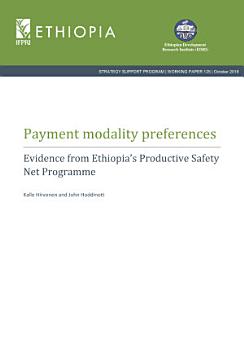Payment modality preferences: Evidence from Ethiopia’s Productive Safety Net Programme
Hirvonen, Kalle · Hoddinott, John F.
Eki 2018 · ESSP Working Paper Kitap 125 · Intl Food Policy Res Inst
5,0star
1 yorumreport
E-kitap
25
Sayfa
family_home
Uygun
info
reportPuanlar ve yorumlar doğrulanmaz Daha Fazla Bilgi
Bu e-kitap hakkında
Economists typically default to the assumption that cash is always preferable to an in-kind transfer. We extend the classic Southworth (1945) framework to predict under what conditions this assumption holds. We take the model to longitudinal household data from Ethiopia where a large-scale social safety net intervention – the Productive Safety Net Programme (PSNP) – operates. Even though most PSNP payments are paid in cash, and even though the (temporal) transaction costs associated with food payments are higher than payments received as cash, the overwhelming majority of the beneficiary households prefer their payments only or partly in food. However, these preferences are neither homogeneous nor stable. Higher food prices induce shifts in preferences towards in-kind transfers, but more food secure households and those closer to food markets and to financial services prefer cash. There is suggestive evidence that preferences for food are also driven by self-control concerns.
Kullanıcı puanları ve yorumlar
5,0
1 yorum
Bu e-kitaba puan verin
Düşüncelerinizi bizimle paylaşın.
Okuma bilgileri
Akıllı telefonlar ve tabletler
Android ve iPad/iPhone için Google Play Kitaplar uygulamasını yükleyin. Bu uygulama, hesabınızla otomatik olarak senkronize olur ve nerede olursanız olun çevrimiçi veya çevrimdışı olarak okumanıza olanak sağlar.
Dizüstü bilgisayarlar ve masaüstü bilgisayarlar
Bilgisayarınızın web tarayıcısını kullanarak Google Play'de satın alınan sesli kitapları dinleyebilirsiniz.
e-Okuyucular ve diğer cihazlar
Kobo eReader gibi e-mürekkep cihazlarında okumak için dosyayı indirip cihazınıza aktarmanız gerekir. Dosyaları desteklenen e-kitap okuyuculara aktarmak için lütfen ayrıntılı Yardım Merkezi talimatlarını uygulayın.










